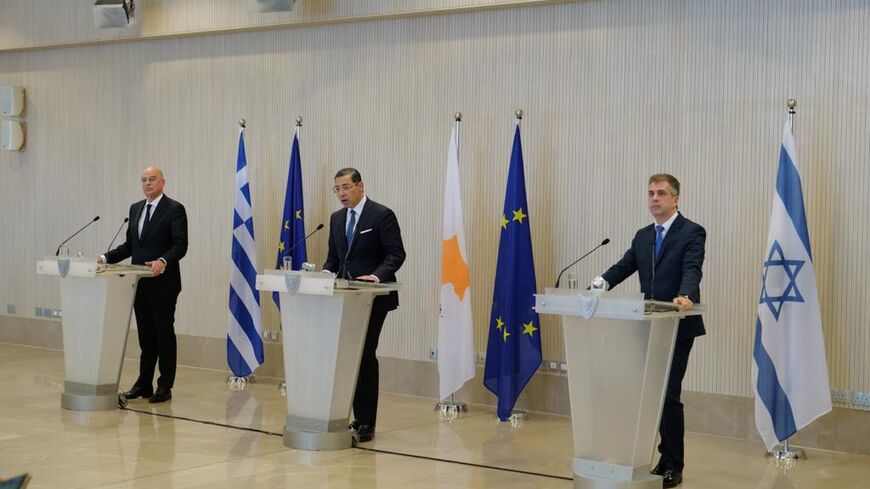Meeting on Friday in Nicosia with his Cypriot and Greek counterparts, Israel’s Foreign Minister Eli Cohen called on the European Union to blacklist Iran's Islamic Revolutionary Guard Corps (IRGC) as a terrorist organization while hailing what he called a "trilateral alliance" between the three countries.
"Iran is a danger to the world. Iranian terrorism hurts the Middle East, Ukraine, Europe and more. I asked my friends, the foreign ministers of Greece and Cyprus, to act to declare the IRGC as a terrorist organization in the European Union," Cohen stated after the meeting. The EU has designated individuals and entities within the IRGC but has been reluctant to make a broad listing of the powerful military Iranian structure out of fear of provoking an escalation with Tehran.
Cohen noted that Israel invests great efforts into its relationship with Greece and Cyprus, with an eye toward global challenges such as energy, joint economic opportunities and the safety of Israeli tourists and Jewish life.
The meeting came just three days after Greek security forces reportedly foiled planned attacks by at least two Pakistani nationals against Israeli and Jewish targets in the country. The Israeli prime minister’s office revealed on Wednesday that the Mossad had assisted Greece in thwarting the terror plan.
A statement issued by the prime minister’s office read, “After the investigation of the suspects began in Greece, Mossad assisted in unraveling intelligence of the infrastructure, the methods of operation and the connection to Iran.” The suspects, it was claimed, were part of a “wide Iranian network that operates from Iran and out of many countries.”
A statement issued by the Cypriot Foreign Ministry said that Friday’s meeting was the third political dialogue at the foreign minister level held between the three countries, calling “the Cyprus-Greece-Israel Trilateral Cooperation Mechanism" "the most advanced of all the trilateral mechanisms."
It read, "With significant progress already having been achieved in establishing the cooperation framework between the three countries in numerous areas, the focus is now on defining the next steps with the aim of further strengthening and deepening the cooperation as well as expanding synergies in the region.”
Israel, Cyprus and Greece have developed an alliance over the last few decades in a variety of fields such as tourism, medicine, cybersecurity, energy and military cooperation. Intelligence sharing and the EuroMed pipeline project are considered especially important cooperation domains.
Ahead of Cohen’s visit to Cyprus, Israel’s ambassador in Nicosia, Oren Anolik, met with the chairman of the Cyprus Energy Regulatory Authority to discuss the electricity, gas and energy plans of the two countries. Anolik also recently met with several Cypriot ministers.
During his previous terms, Prime Minister Benjamin Netanyahu invested a great deal of effort into developing this regional alliance, as did the two prime ministers who succeeded him, Naftali Bennett and Yair Lapid. Lapid in particular reassured Athens and Nicosia that Jerusalem’s efforts to rehabilitate ties with Ankara would in no way harm the trilateral alliance.
Last month, Netanyahu spoke on the phone with Cypriot President-elect Nikos Christodoulides. The two leaders discussed cooperation on trade, defense, energy and tourism and agreed to convene a trilateral summit with Greece later this year. No date has been published yet for the event.
This month, air and naval forces from Israel, Greece, Cyprus and the United States launched the “Noble Dina 2023“ joint military exercises in the eastern Mediterranean Sea with an emphasis on anti-submarine warfare, surface warfare and search and rescue operations. Four days later, Cyprus and Israel signed in Tel Aviv a bilateral defense cooperation program between the two armies, as well as a corresponding tripartite program for 2023 with the Greek defense forces.







